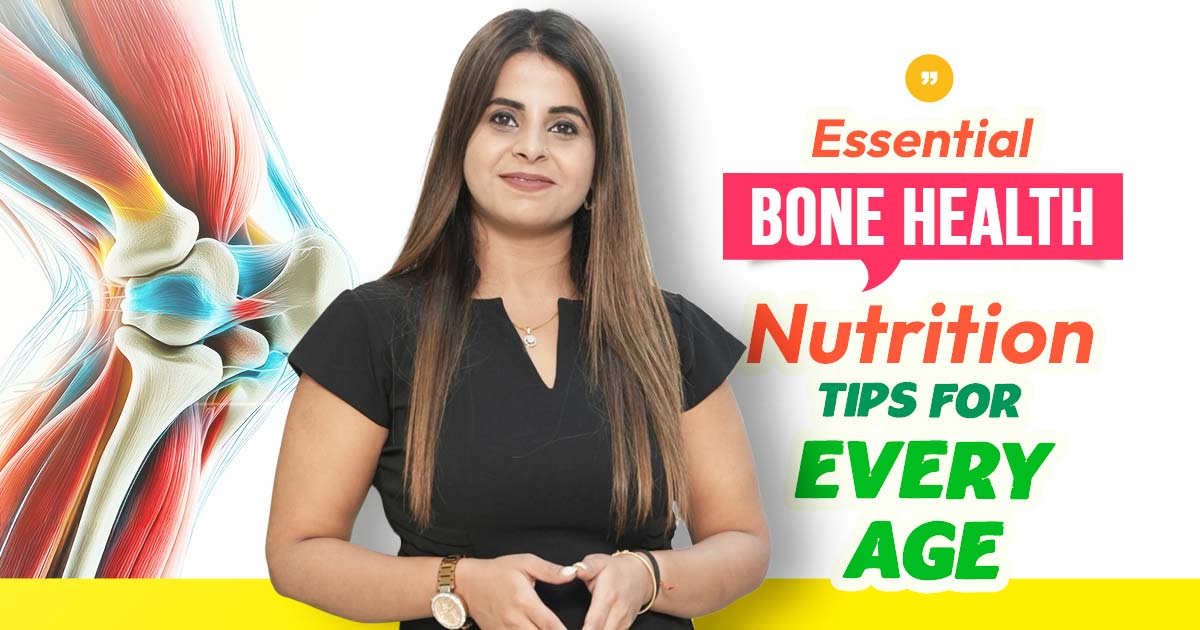Health in general means fitness, weight management and strong immunity. We have made this definition on our own as we hear people talk only about these most of the time under the headline of Health. What we miss is the discussion about bone health nutrition. Our bones are not just the framework of our body, instead they play an important role in protecting our inner organs, enabling movement and even storing minerals. Just like all other parts of the body, bones also need the right bone nutrition varying at every stage of life.
We all know that our nutritional needs keep on changing from childhood to old age. We need to care for our bones in the same way. In this article we will learn some practical bone health tips that are approved by science and are age-specific so you don’t feel that the route to stronger bones and a stronger you is hard.
Why Bone Health Nutrition Matters?
Who thought that bones also rebuild themselves? Yes that’s the fact. Bones are not non living frames but they are living tissues. Every 7 to 10 years, our skeleton completely renews itself. But the quality of the process and result depends on how much nutrients like calcium, vitamin D, protein and magnesium were present in the body to work on the bones.
What Happens if Bone Nutrition is Ignored?
People generally understand bone health after a few years of life. When ageing hits hard through joint pain, osteoporosis, frequent fractures and weak bones, we cry over not taking good care of our bones. Healthy bones should be built early and we should maintain them as it is going to be the best investment in long-term mobility and independence.
Key Nutrients for Strong Bones
No matter your age, these nutrients are the pillars of bone health nutrition:
- Calcium – We have all read in our books that calcium is the building block of bones. We get calcium through various dairy products like milk, yogurt, cheese and other sources are: sesame seeds, ragi, tofu, and green leafy vegetables.
- Vitamin D – Bones cannot directly absorb the calcium that we consume. It needs the help of Vitamin D which we get from: sunlight, eggs, fatty fish, and fortified foods.
- Protein – Protein provides structure to bones. We must consume the required amount of protein according to our weight daily. Its sources are: pulses, lentils, dairy, lean meats, eggs, and nuts.
- Magnesium & Phosphorus – These minerals are crucial for bone mineralization. It can be found in whole grains, seeds, nuts, and legumes.
- Vitamin K – Vitamin K binds calcium to bones. Its sources are: spinach, kale, broccoli.
Bone Health Nutrition for Different Ages
1. Bone Nutrition for Kids
Yes we do have a tough time making our children eat healthy food during early years. This approach gives its result when they get old. What children eat today determines how strong their bones will be as adults. Nearly 90% of peak bone mass is built until they reach adolescence. Be sure to give these food items to your kids for their bone health:
- Dairy products: Milk, paneer, and yogurt
- Whole foods: Do not hold on to wheat roti always. Encourage ragi, bajra, green veggies, and nuts.
- Sunshine vitamin: Lots and lots of outdoor play to get natural vitamin D.
- Balanced meals: A mix of protein, whole grains, and fruits prevents nutrient gaps.
While this sounds easy, we know how parents struggle with the picky eating habits of their children. This is where consulting a paediatric nutritionist can help. A specialist can design meal plans that are both child-friendly and nutrient-dense, ensuring kids don’t miss out on vital bone health nutrition.
2. Bone Health in Teenagers
Teenagers experience growth spurts which means their body demands more nutrients in this phase. They require a diet that is particularly rich in calcium and protein as they both work as building blocks. Unfortunately, this is also the stage when junk food and sodas creep in which leads to calcium loss. What should be done then? Follow some simple tips:
- Replace soft drinks with smoothies or milkshakes.
- Add high-protein snacks like roasted chana, eggs, or peanut butter sandwiches.
- Involve them in sports or outdoor activities that strengthen bones.
3. Bone Nutrition for Adults (20s–40s)
From newborn to age 20, it is the time to build bones. Once we reach 20, this process slows down. Now we are at the stage of maintaining the bone mass gained throughout these years. Each phase has its own weakness, during this phase we are busy in our sedentary jobs and have no time to work on our health. Bone health is often neglected with this.
These tips for adults can help:
- If lactose intolerant is an issue, try including almond milk or soy milk fortified with calcium to complete the requirement.
- Exercise smartly: Take out time for your health and focus on weight-bearing exercises like walking, jogging, or resistance training to support bone density.
- Limit caffeine and alcohol: Excessive amounts interfere with calcium absorption.
- Don’t skip sunlight: Even a 15-minute walk outdoors supports vitamin D levels.
4. Bone Health for Women
A woman faces a lot of problems in her body throughout her life. Irony is that she takes care of each member in the family but denies self care. Especially after menopause, women are more prone to osteoporosis as there are lots of hormonal changes in their body. Some non-negotiable tips for women for bone health are:
- Include Iron+calcium combo in your diet. It’s not fancy, it’s important.
- Post-pregnancy nutrition: Breastfeeding mothers lose nutrients from their body to provide the best to their newborn. They should pay extra attention to calcium and vitamin D for faster recovery and good health.
- Menopause care: Soy products (rich in phytoestrogens) can help balance bone loss.
5. Bone Nutrition for Seniors (50+)
After 50, bone density naturally starts declining, making fractures more likely. Seniors need bone health nutrition paired with safe physical activity.
Tips for seniors:
- Choose easy-to-digest calcium sources like yogurt, soft cheese, and lightly cooked greens.
- Take vitamin D supplements if sunlight exposure is limited.
- Stay active with low-impact exercises like walking, tai chi, or yoga.
- Ensure adequate protein intake—dal, fish, eggs, or pulses at every meal.
Lifestyle Habits That Strengthen Bones
- Avoid Smoking: Smoking reduces bone density.
- Watch Your Weight: Both obesity and being underweight can harm bone health.
- Sleep Well: Deep sleep regulates hormones essential for bone repair.
- Stay Active: Physical activity stimulates bone-building cells.
Busting Myths About Bone Health with Facts
1. Only Milk Matters
Yes, milk is a great source of calcium but not the only source. There are many non-dairy products too.
2. Bone Loss Happens Only in Old Age
Risk factors like poor diet, lack of exercise in youth can lead to weak bones even at early age.
3. Supplements Are Enough
Supplements can fill the gap but they cannot completely take the place of a balanced diet meal.
Conclusion
Investing in bone health means investing in our overall quality of life. Our bones silently support every movement, every step, and every smile we make. We can build the foundation for an active, pain-free, and independent life by making mindful choices. Regular weight-bearing exercises, some sunshine walks and a balanced diet can work wonders.
If you are a parent concerned about your child’s nutrition, consulting a paediatric nutritionist can help shape strong bones early on. And if you’re an adult looking to improve your diet for stronger bones, reaching out to the best dietician can give you personalized guidance. After all, strong bones truly mean a stronger you—at every age.



